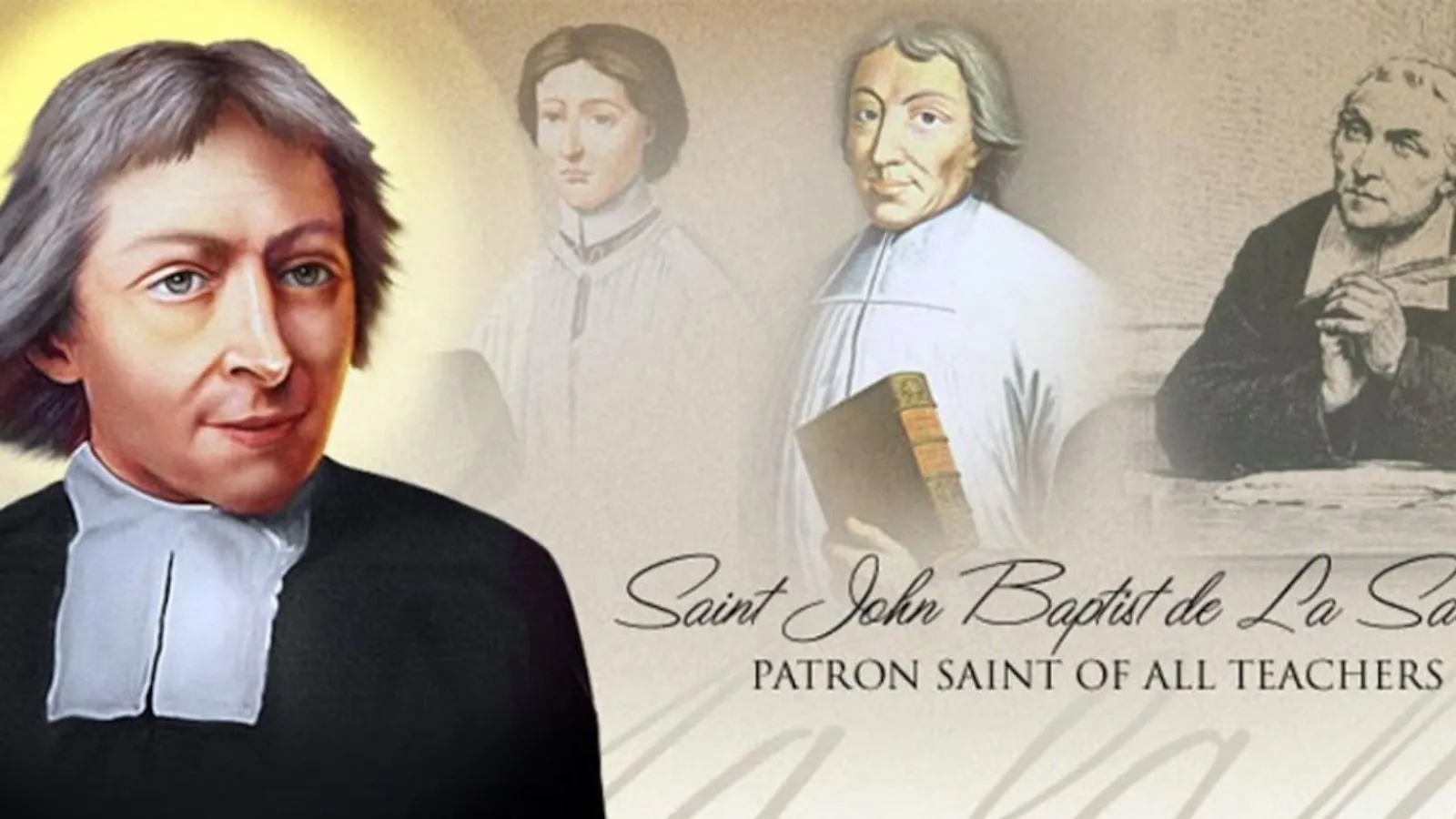Many people search for the term “patron saint of educators” when looking for inspiration, protection, or guidance in the field of teaching. Educators often face challenges that test their patience, wisdom, and compassion. Therefore, they seek a symbolic figure who represents dedication to learning and faith in knowledge. However, there’s often confusion about who the true patron saint of educators is, since several saints are linked with education. This article will clear that confusion and explain the history, origin, and relevance of this important title. Furthermore, you’ll discover the cultural variations, modern usage, and how this phrase appears across English dialects and writing styles.
Patron Saint of Educators: Honoring St. John Baptist de La Salle

In order to carry out their admirable work, educators frequently look for inspiration and spiritual direction. Because of his groundbreaking contributions to contemporary education and his commitment to teaching the underprivileged and disenfranchised, St. John Baptist de La Salle is honoured as the Patron Saint of Educators in the Catholic tradition.
Who Was St. John Baptist de La Salle?
St. John Baptist de La Salle (1651–1719) was a French priest and educational reformer who founded the Institute of the Brothers of the Christian Schools. His contributions include:
- Establishing free schools for underprivileged children
- Training teachers with structured pedagogy
- Promoting classroom-based learning over private tutoring
- Integrating moral and spiritual development into education
Patron Saint of Educators – Quick Answer
The patron saint of educators is St. John Baptist de La Salle, who dedicated his life to improving education and supporting teachers. He founded the Institute of the Brothers of the Christian Schools, focusing on accessible education for the poor. However, many people regard other saints—such as St. Thomas Aquinas and St. Gregory the Great—as protectors of teachers and scholars.
For example, teachers might pray to St. John Baptist de La Salle before starting the academic year, while students preparing for exams often honor St. Thomas Aquinas.
The Origin of “Patron Saint of Educators”
The term “patron saint” originates from the Latin word “patronus,” meaning protector or advocate. In Christianity, therefore, a patron saint serves as a spiritual intercessor for individuals in specific professions or causes. As education gradually developed into a structured profession during medieval Europe, the phrase “patron saint of educator” naturally emerged to honor those who dedicate their lives to teaching.
During this period, scholars often worked under the Church’s guidance, so saints like St. Thomas Aquinas, a Doctor of the Church, became symbols of intellectual excellence. Over time, St. John Baptist de La Salle was officially declared the patron saint of teachers in 1950 by Pope Pius XII.
British English vs American English Spelling
Although “patron saint of educators” is a universal phrase, its spelling and context may slightly vary between British and American English. For instance, while both regions use “educator,” British writing often prefers the term “teacher” or “tutor” in common speech. Additionally, British English tends to emphasize formal religious titles, whereas American English simplifies them for general use.
| Aspect | British English | American English |
|---|---|---|
| Common phrase | Patron Saint of Teachers | Patron Saint of Educators |
| Usage in context | Religious and historical writing | Academic and motivational writing |
| Popular saints | St. Thomas More, St. Gregory the Great | St. John Baptist de La Salle, St. Elizabeth Ann Seton |
| Preferred tone | Traditional, reverent | Inspirational, modern |
Thus, while the phrase remains consistent, its tone and application differ slightly across regions.
Which Spelling Should You Use?
If your audience is global, you can safely use “patron saint of educators”, as it is recognized internationally. However, for UK readers, “patron saint of teachers” may sound more familiar and traditional.
Academic websites, blogs, and Christian publications benefit from using the full title “patron saint of educators” to promote clarity and inclusiveness. If your audience primarily lives in the United States, this version matches their cultural understanding more effectively.
In short, use the version that fits your target audience and content tone.
Common Mistakes with “Patron Saint of Educators”
Writers and students often make minor errors with this phrase. Below are some common mistakes and their corrections:
| Mistake | Correction |
|---|---|
| Patron saint for educators | Patron saint of educators |
| Patron saints of educator | Patron saint of educators |
| St. John de La Salle | St. John Baptist de La Salle |
| Patron saint teacher | Patron saint of teachers |
Always use “of” after “patron saint” and ensure proper capitalization for saint names and titles.
“Patron Saint of Educators” in Everyday Examples
You can find this phrase in many contexts, from church bulletins to social media posts and educational websites. Below are real-world examples:
- Email: “We honor St. John Baptist de La Salle, the patron saint of educator, during Teacher Appreciation Week.”
- Social Media Post: “To all teachers: may the patron saint of educator inspire your dedication and wisdom.”
- News Headline: “Catholic schools celebrate the feast of St. John Baptist de La Salle, patron saint of educator.”
- Formal Writing: “The patron saint of educator symbolizes the divine calling behind the profession of teaching.”
Transition words such as furthermore, moreover, therefore, and however often appear naturally in these contexts, connecting thoughts smoothly.
“Patron Saint of Educators” – Google Trends & Usage Data
According to Google Trends, searches for “patron saint of educators” spike around Teacher’s Day (May 15) and Catholic feast celebrations in April. The term is most popular in the Philippines, the United States, and Ireland, where education and faith are deeply intertwined.
| Country | Search Popularity | Common Related Term |
|---|---|---|
| Philippines | Very High | Patron Saint of Teachers |
| United States | High | Patron Saint of Education |
| Ireland | Medium | Saint for Teachers |
| UK | Medium | Patron Saint of Scholars |
| Canada | Moderate | Catholic Saint of Teachers |
This data shows how the phrase bridges faith and profession, making it relevant across cultures and continents.
FAQs about the Patron Saint of Educators
1. Who is the official patron saint of educator?
The Church officially recognizes St. John Baptist de La Salle as the patron saint of educator.
2. When is his feast day celebrated?
It is celebrated on April 7 each year.
3. Are there other saints for teachers?
Yes, many people associate St. Thomas Aquinas, St. Gregory the Great, and St. Elizabeth Ann Seton with education.
4. What is the prayer to the patron saint of educators?
“St. John Baptist de La Salle, guide us in our mission to teach with love, patience, and wisdom.”
5. Why do educators honor saints? Educators often honor saints because they seek spiritual strength, motivation, and protection throughout their teaching journey. In doing so, they connect their professional mission with a deeper sense of purpose and faith.
6. Can non-Catholic teachers honor the patron saint of educator? Absolutely. In fact, many non-Catholic teachers view St. John Baptist de La Salle as a universal symbol of dedication to education. His values transcend religious boundaries and resonate with anyone committed to learning and teaching.
7. What is the meaning of being a patron saint? In essence, being a patron saint means serving as a spiritual guardian or advocate for a particular group, profession, or cause. This role offers comfort, guidance, and inspiration to those who seek it.
Conclusion
St. John Baptist de La Salle, the patron saint of educators, embodies wisdom, compassion, and a deep commitment to teaching. His story inspires educators to find purpose and passion in their work. The phrase “patron saint of educators” bridges faith and learning, emphasizing that education involves not just knowledge but also values and service. Whether you teach in the US, UK, or anywhere else, using this term connects you to a global tradition that honors and respects teachers. It celebrates those who devote their lives to enlightening others.


Leave a Reply